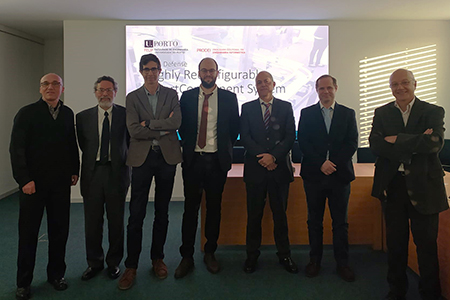Candidate
Luís Carlos de Sousa Moreira Neto
Date, Time and Place
January 31, 14:15, Sala de Atos FEUP
President of the Jury
Carlos Miguel Ferraz Baquero-Moreno, PhD, Full Professor, Department of Informatics Engineering, Faculdade de Engenharia, Universidade do Porto.
Members
Julio Luis Medina Pasaje, PhD, Associate Professor, Departamento de Ingeniería Informática y Electrónica, Facultad de Ciencias, Universidad de Cantabria, Espanha;
António Eduardo Vitória do Espírito Santo, PhD, Assistant Professor, Department of Mechanical Engineering, Faculdade de Engenharia, Universidade da Beira Interior;
Pedro Nuno Ferreira da Rosa da Cruz Diniz, PhD, Full Professor, Department of Informatics Engineering, Faculdade de Engenharia, Universidade do Porto;
Luis Miguel Pinho de Almeida, Associate Professor with Habilitation, Department of Electrical and Computer Engineering, Faculdade de Engenharia, Universidade do Porto;
Gil Manuel Magalhães de Andrade Gonçalves, PhD, Assistant Professor, Department of Informatics Engineering, Faculdade de Engenharia, Universidade do Porto (Supervisor).
Abstract:
“Across all sectors of our society, efficiency is an increasingly paramount concern for a sustainable world. While the significance of efficiency spans all levels, it is at a large scale where the impacts of efficient practices are most prominently noticed. Industrial activities are an example of how efficiency traduces in visible results. It doesn’t require extensive reasoning to recognize that everyday increasingly affordable goods we consume are a direct outcome of these efficiency demands. The market is demanding new services and business models that center the end user in the product design. In the near future, consumers will be able to customize a product on-line, place a production order, and see it delivered, all in the same day. This remarkable possibility arises from of a combination of efficiency and flexibility within the production processes. Several names have been used to describe the same fundamental paradigm in both academic and industrial contexts: Factories of the Future, Smart Manufacturing and Industry 4.0, all remounting to the same technological advent. This concept has far-reaching implications, extending its influence across multiple technological domains, presenting a wealth of research opportunities and driving the need for innovative technologies. This thesis delves into two technological domains related with this new paradigm and tackles one key problem in either domain. Within the Cyber-Physical Production Systems (CPPS) domain, it addresses the problem of establishing a unified network of industrial assets where software and its connections to other assets are clearly discernible and recognized. On the Reconfigurable Manufacturing Systems (RMS) domain, it addresses the fast pace at which the production lines will have to reconfigure, in particular, how software will have to reconfigure in parallel with the production lines and the ease with which new software can be developed and deployed to meet emerging challenges. A solution to both problems emerges from the field of Component-Based Software Engineering (CBSE), where this thesis drew inspiration to develop an innovative Smart Component with enhanced software reconfiguration and deployment capabilities. The proposed system exploits using Linux, a general-purpose operating system, as the component runtime environment (RTE). A combination of shared memory for efficient component communication and parallel and reconfigurable computing properties for enhanced throughput allows the proposed system to meet established application performance standards while maintaining a high degree of flexibility and reusability. The Smart Component’s flexibility is demonstrated through the implementation of two component models. The IEC 61499 component model, designed to model event-driven distributed applications for industrial system monitoring and control, and the Smart Object Self-Description (SOSD), developed by the author to describe software components, their interconnections, and their associations with industrial assets. The IEC 61499 implementation was directly compared to existing RTEs, outperforming them in real-world use cases and equaling the performance of one RTE in a literature benchmark. Additional benchmarks to assess the Smart Component’s reconfiguration performance and simplified software component development method were proposed in this thesis. The effectiveness of the SOSD implementation was validated through its application in a real-world use case, furnishing other CPPS nodes with context regarding the origin of the collected data and the software components responsible for its processing. By using Linux as the RTE, a software layer traditionally dedicated to manage components was deemed unnecessary, due to the system’s ability to execute applications conforming to relevant performance standards, while showing superior software flexibility, and even outperforming existing RTEs which employ the traditional approach. Many runtime environments for software components exist, but few allow the deployment of components built in more than one programming language, and none – to the best of the author’s knowledge – allow the development of components in any language – provided that language is at least able to read and write to files. The simplicity of developing regular software program for Linux and converting it into a software component is a promising feature that should benefit the development of industrial control and monitoring applications by bringing along the benefits of multiple high-level programming languages.”
